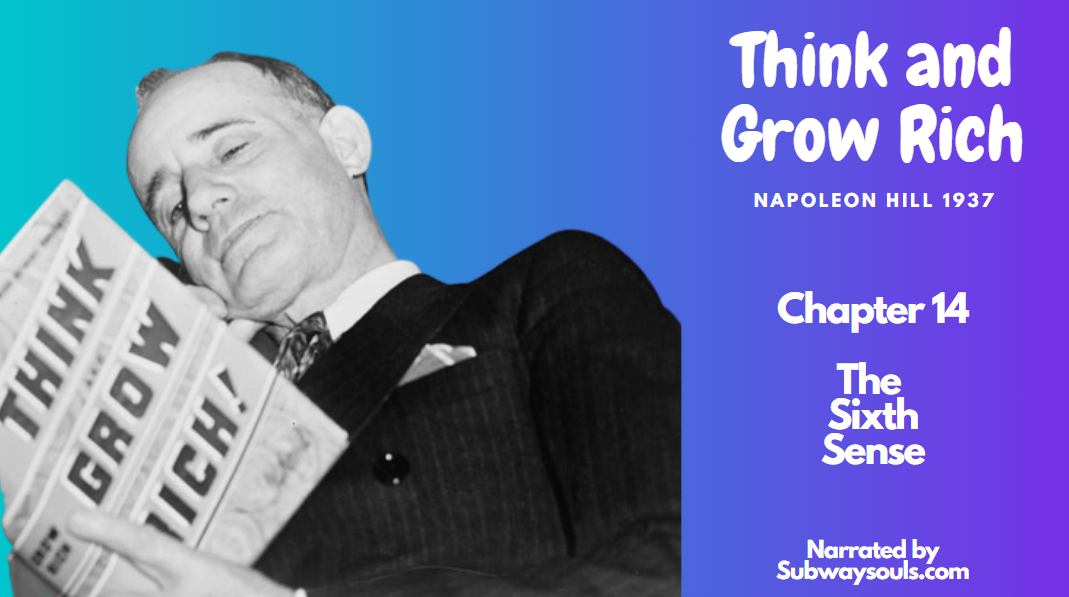Chapter 14 of “Think and Grow Rich” by Napoleon Hill is titled “The Sixth Sense: The Door to the Temple of Wisdom.” This chapter explores the concept of the sixth sense, which is a higher faculty that allows individuals to tap into intuition, inspiration, and insight beyond the five physical senses. Here is a summary of the key points covered in this chapter:
- Defining the sixth sense: Hill explains that the sixth sense is the channel through which infinite intelligence communicates with individuals. It is an inner faculty that goes beyond the five physical senses and allows individuals to access higher levels of wisdom and understanding.
- The development of the sixth sense: Hill suggests that the sixth sense can be developed and strengthened through a combination of desire, imagination, intuition, and the ability to interpret and act upon subtle cues and signals from the universe.
- The role of the subconscious mind: Hill emphasizes that the subconscious mind is closely connected to the sixth sense. By harmonizing the conscious and subconscious minds, individuals can tap into intuitive insights and access higher levels of knowledge and understanding.
- Overcoming scepticism and doubt: Hill acknowledges that scepticism and doubt can hinder the development and utilization of the sixth sense. He encourages individuals to maintain an open mind, trust their intuition, and be receptive to new ideas and possibilities.
- Recognizing the sixth sense in action: Hill provides examples of individuals who have successfully utilized the sixth sense to make informed decisions and achieve extraordinary results. He emphasizes the importance of being attuned to intuitive hunches and insights and acting upon them with faith and confidence.
- Cultivating receptive silence: Hill suggests that practising moments of silence and solitude can help individuals attune to their sixth sense. By quieting the mind and creating space for reflection and introspection, individuals can better receive intuitive guidance.
- Combining the sixth sense with practical action: Hill emphasizes that the sixth sense should be combined with practical action. While intuition and inspiration are valuable, they must be accompanied by deliberate and persistent effort to translate them into tangible results.
- The importance of faith: Hill emphasizes that faith is a key element in developing and utilizing the sixth sense. By believing in the unseen, trusting one’s intuition, and having faith in one’s abilities, individuals can tap into the limitless possibilities of the sixth sense.
In summary, Chapter 14 of “Think and Grow Rich” explores the concept of the sixth sense as a higher faculty that allows individuals to tap into intuition, inspiration, and insight. It emphasizes the development and cultivation of this inner sense through desire, imagination, intuition, and the harmonization of the conscious and subconscious minds. The chapter highlights the importance of overcoming scepticism, recognizing intuitive insights, and combining the sixth sense with practical action. By trusting in the unseen, practising receptive silence, and having faith, individuals can unlock the door to the temple of wisdom and access extraordinary levels of knowledge and understanding.
NB: The above is one chapter from the book “Think and Grow Rich” written by Napoleon Hill and first published in 1937.
It is considered one of the most influential self-help books ever written and has sold millions of copies worldwide. The book aims to inspire readers to achieve success in their personal and professional lives by adopting a mindset of wealth and abundance.
The central theme of “Think and Grow Rich” is that success begins with one’s thoughts and beliefs. Napoleon Hill presents a philosophy of success based on the idea that our thoughts can directly influence our actions and ultimately shape our reality. He argues that by developing a burning desire for a specific goal and aligning one’s thoughts, beliefs, and actions with that desire, individuals can overcome challenges and achieve extraordinary success.
Throughout the book, Napoleon Hill shares principles and strategies for achieving success. These include:
1. The power of thought: Hill emphasizes the importance of maintaining a positive mental attitude, visualizing success, and having a clear and definite purpose.
2. Goal setting: He encourages readers to set specific, measurable, achievable, relevant, and time-bound goals (often referred to as SMART goals) and to create a detailed plan for their attainment.
3. Persistence: Hill emphasizes the need for persistence in the face of challenges, setbacks, and failures. He suggests that persistence is a key trait shared by successful individuals.
4. Mastermind groups: Hill emphasizes the importance of surrounding oneself with like-minded individuals who share similar goals and aspirations. He believes that collaborating and exchanging ideas with such a group can lead to greater success.
5. The subconscious mind: Hill explores the power of the subconscious mind and suggests techniques for programming it to support success. He introduces the concept of autosuggestion, which involves repeating positive affirmations and beliefs to reprogram the subconscious mind.
6. The importance of action: Hill emphasizes the need to take consistent and decisive action towards one’s goals. He argues that thoughts alone are not enough; they must be accompanied by action.
“Think and Grow Rich” also features numerous anecdotes and success stories from notable figures such as Thomas Edison, Henry Ford, Andrew Carnegie, and many others. These stories serve to illustrate the principles discussed in the book and provide inspiration and motivation for readers.
Overall, “Think and Grow Rich” presents a philosophy of success that focuses on the power of thoughts, beliefs, and actions. It provides practical strategies and principles that individuals can apply to achieve their goals and attain wealth, not just in terms of money but also in terms of personal fulfilment and happiness.

